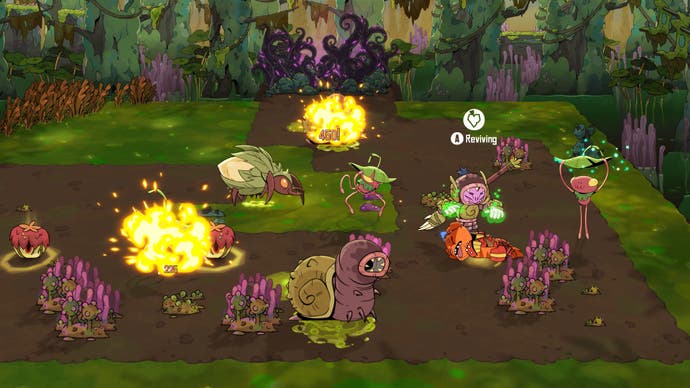I'm switching back and forth between Hades 2 and Rotwood at the moment, which is probably why I've found myself tangled up in how the two games are similar and how they're different.
On paper, you can make them sound really quite similar: Like Hades 2, Klei's latest is an action-RPG in which you take your character and head out through a series of enemy-filled rooms, defeating all the monsters you see in each room to earn a choice of perk or upgrade of some kind. You slowly build your character for each run, then, by picking upgrades and then picking the next room based on the kind of upgrade it's going to offer. Throw in bosses and permanent character upgrades and different weapon classes and, hey, isn't that sort of Hades?
In reality, though, nobody would mistake these two games. It's a bit like how I can instantly tell whether the LA-based luxury realtor reality show on television is Selling Sunset, Million Dollar Listing or Buying Beverly Hills: sometimes the similarities are superficial, while the differences go deep.
So from the off, Rotwood is a much slower game. You don't dash, the enemies and environments are chunkier and more readable, and in the earlier levels at least, there's a lot more time to react to stuff. A lot of this is because Rotwood's a co-op game. I've been playing alone, but it really wants you to party up with friends and rattle through your rooms together, and you'll all need time to make sense of what's going on in that kind of scenario.
It's knockabout stuff at first, which means the goofy cartoon aesthetic makes sense, and it also lends the game a particular character. Hades' enemies explode like they're made of Swarovski crystal; Rotwood's explode like they're water balloons. I'm generally hitting them with a big hammer, and there's a lovely squishiness as they bounce back under the blows, and then they pop when they're finally done-in. (It helps that they're often mutated onions and cherries and things like that.)
Because this is Klei, of course, who made games like Invisible, Inc, and Don't Starve, breezy visuals conceal a game of depth and a lot of thinking. The choice of upgrades you get at the end of each encounter are a case in point: it can be genuinely challenging to pick between them. Do I want my first attacks in a new room to be more powerful, or do I want the chance to resurrect the odd downed enemy as an ally? Throw in shops and armorers and all that jazz and things get really busy. But for me, the genius of it – and the Klei-ness, comes with the masteries.

Masteries are a series of challenges you work through in your first few hours that give you rewards for learning the basics of the game. Okay, not remove the basics, the stuff that exists below that, which a lot of players – well, me, at least – might get frightened by and try to ignore. So there are masteries for teaching you hit streaks and criticisms, but there are also masteries for teaching you stuff like dodge rolls and dodge cancels. Because I'm being rewarded, I'm more likely to try and do this stuff, and because the game makes it clear in the moment when I'm actually doing this stuff, even happy accidents become learning moments.
I like Rotwood because of this particular combination, I think: a silly, trifling surface and depths that will hopefully support co-op play through Early Access and beyond. To put it slightly differently, a nuanced game that understands player incentives. Who does that remind me of? It was exciting to learn that a team as brilliant and thoughtful as Supergiant was doing a straight-up roguelite: all that polish and poise! It's equally exciting to learn that a team as brilliant and thoughtful as Klei have been cooking their own up too. Rotwood is a game whose systems reflect the people who made it.
#Klei39s #latest #game #sounds #Hades #Hades

